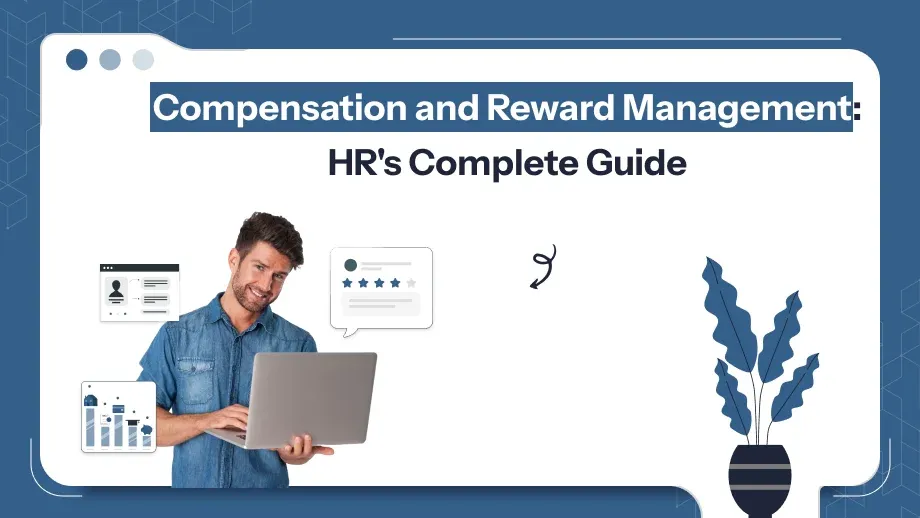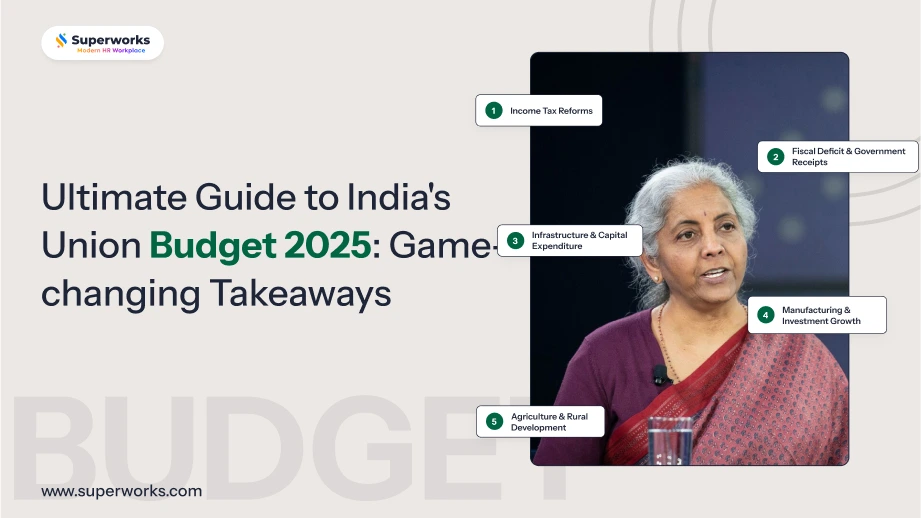
What is compensation and reward management? This isn’t just about the pay of employees. It’s all about making an incentive system that is fair and inspires them to do the best they can. It is essential in attracting the best talent keeping key employees as well as aligning employee efforts to business goals. Organizations today must move beyond basic pay structures. They need systems that combine salaries, benefits, and unique rewards. The payroll software has to accommodate the diverse population with different demands and requirements.
In this blog, we’ll teach you how to understand and apply compensation and reward management. The guide here will cover different types of rewards, teachings about “How to set up an incentive system”, as well as the recent trends that are shaping this field. So, let’s start with the learning by clearing doubts about compensation and reward management.
Compensation and Reward Management
Management of reward and compensation is the art of establishing and operating a system that makes sure that employees are properly recognized and rewarded. The system includes salary bonus, rewards, along with other rewards that are geared towards aligning the performance of employees with company targets.
And if you will have a look, then you will find that in HRMS, the compensation and reward management plays a vital role. It helps to balance employee satisfaction and the efficiency of an organization, making sure everyone is working together towards common objectives.
Types of Rewards in Compensation Management
A robust rewards and compensation management system provides a mix of financial and non-monetary reward. The rewards are designed to motivate employees, improve job satisfaction and help them achieve organizational goals.
1. Monetary Rewards:
Rewards for financial performance directly impact the financial health of an employee. They can be classified as:
- Direct Compensation: Includes salary as well as hourly earnings, bonuses and incentive programs based on performance. These are the most important rewards to keep top performers and improving personal efficiency.
- Indirect Compensation: It includes advantages like retirement insurance, health insurance as well as paid leave. They add value to the employee’s compensation plan and improve the overall level of satisfaction.
2. Non-Monetary Rewards:
Non-monetary rewards focus on recognition, development, and work-life balance. These rewards include:
- Recognition Programs: Celebrating employee achievements with awards, public recognition, or simple acknowledgment during team meetings.
- Professional Development Opportunities: Providing classes, certifications or mentoring opportunities to aid employees to advance their careers.
- Benefits of Work-Life Balance: Flexible timetables, remote working and wellness-related initiatives like gym memberships, or help with mental health.
Importance of a Balanced Reward System:
The combination of non-monetary and monetary incentives ensures that employees are happy and secure financially. An approach that is balanced creates an enthusiastic, committed and productive employees.
Ready to build a winning compensation strategy?
Start creating systems that attract top talent and boost employee morale today!
Reward in Compensation Management: Key Components
Rewards in compensation management go beyond paychecks. They include various elements that recognize and reinforce employee contributions. An organized reward program ensures that employees are motivated and feel appreciated.
Key Components of Rewards in Compensation Management:
1. Performance-Based Rewards:
They are directly tied to performance by employees. They include sales commissions, bonus for performance, as well as profit sharing programs. These programs encourage employees to go beyond expectations, and help to achieve company targets.
2. Equity Compensation:
These include stock options and limited shares (RSUs) as well as employees’ ownership programs. Equity compensation provides employees with an ownership stake in the business, and aligns their achievements with that of the business’s expansion.
3. Recognition and Appreciation:
Small gestures such as thank-you cards and public shout-outs “Employee of the Month” programmes can be very effective improving the morale of employees. The recognition of accomplishments and effort creates the positive work environment.
4. Flexible Benefits and Perks:
Giving benefits that can be tailored to the individual preferences, such as support for childcare as well as wellness and health programs or options for extended leave – helps to adapt to the diverse needs of employees.
5. Career Development Opportunities:
Offering mentoring programs, training and opportunities for growth allows employees to develop their abilities. This also boosts the loyalty of employees by demonstrating a dedication to the success of their company for the long run.
Why These Components Matter:
Each one of these elements can contribute to employee satisfaction and retention. If employees are able to feel valued and are rewarded for their work They are more likely to be engaged and perform at an optimal standard.
Developing a Reward System in Compensation Management
The creation of a system for reward in compensation management in HRM demands a deliberate strategy. It is important to create an arrangement that matches the business goals, inspires employees and promotes honesty and fairness.
Steps to Develop an Effective Reward System:
1. Define Clear Objectives:
Set the goals you want to achieve by setting up an incentive system. In other words, are you intend to boost employee retention and increase productivity? Or to recruit top performers? Clear goals determine the overall procedure.Clear objectives guide the entire process.
2. Benchmark Compensation:
Research industry standards and competitor practices to ensure your compensation packages are competitive. Consider regional differences and industry trends to tailor your offerings effectively.
3. Segment Your Workforce:
Different employees are assigned different expectations, roles as well as expectations. Create a segmented workforce that can provide incentives that are geared towards particular groups like the top performers, newly hired employees and long-term employees.
4. Design a Mix of Rewards:
Combine monetary rewards like salary and bonuses, with other benefits such as flexible working arrangements and opportunities for development. An appropriate mix will appeal to a wider range of employee.
5. Ensure Fairness and Transparency:
All Employees should understand how rewards are earned and distributed. Transparent communication builds trust and prevents misunderstandings.
Incorporate Performance Metrics:
Make rewards to measurable performance indicators , like the sales target, customer satisfaction scores or even the completion of milestones for projects. The reward system is merit-based and objective.
5. Regularly Review and Adjust:
Employee needs and market trends evolve. Regularly review your reward system to ensure it remains relevant, competitive, and effective.
Tips for Success:
- Use employee surveys to gather feedback on your reward system.
- Leverage HR technology for efficient management and monitoring.
- Communicate the benefits and processes of the reward system clearly to all employees.
Current Trends in Compensation and Reward Management
The landscape of compensation reward management is constantly evolving. Organizations must stay updated on trends to attract and retain talent effectively. Here are the key recent trends in compensation management and reward management shaping the workplace today:
1. Pay Transparency
Companies are adopting open pay policies to foster trust and fairness. By clearly outlining salary ranges and bonus structures, organizations enhance transparency and reduce pay-related conflicts.
2. Personalized Benefits
Standardized benefits are being replaced with customizable options. Employees are now able to choose benefits that are tailored to meet their specific requirements, including services for mental health such as childcare services, mental health resources, or the option of taking a leave plans.
3. Wellness Incentives
The importance of employee health is now a top priority. Health rewards such as the gym and mindfulness apps or fitness days can improve physical and mental well-being and boost productivity.
4. Flexible Work Arrangements
The growth of remote and hybrid models of work has resulted in new rewards strategies. Flexible options, like remote work stipends, or coworking benefits, to suit contemporary workplace preferences.
5. Performance-Based Pay Models
Companies are more often tying their compensation to performance-related metrics. Pay-for-performance programs provide employees with a reward based on tangible results, encouraging quality and accountability.
6. Equity Compensation Growth
Both established and startup companies employ equity compensation strategies including Profit-sharing or stock options to encourage long-term commitment, and to align the success of employees with the growth of their business.
List of Challenges in Compensation and Reward Management
Management of compensation and reward programs aren’t always easy. There are many challenges to be faced by organizations that require meticulous preparation and implementation. The solution to these problems is an efficient and fair process that is able to meet employee as well as business requirements.
1. Pay Equity and Fairness
Ensuring that employees get paid in a fair way for their jobs and duties is a continuous problem. Inequalities in pay can cause complaints and legal proceedings. Companies must regularly assess and correct wage gaps.
2. Budget Constraints
Balancing competitive rewards with budget limitations can be tough. Organizations need to allocate resources wisely while ensuring their compensation packages remain attractive.
3. Compliance with Legal Regulations
Regulations regarding wages, benefits and equity differ between regions. Failure to adhere can lead to lawsuits, fines as well as harm to the reputation of the business.
4. Evolving Workforce Expectations
Modern employees seek more than just salaries. They value flexibility, professional growth, and wellness support. Meeting these evolving expectations requires adapting traditional compensation models.
5. Retention of High Performers
Insuring that top performers are retained is essential to long-term success. An unintentionally designed reward system may lead to turnover particularly for employees who are looking for recognition and competitive rewards.
6. Balancing Internal and External Equity
- Internal Equity: Employees performing similar roles expect comparable compensation.
- External Equity: Salary should conform to industry standards in order to be competitive.Finding the perfect balance between these two can be an ongoing struggle.
7. Communicating Compensation Plans
A lack of transparency in the way in which rewards are decided could cause confusion and distrust within employees. A clear communication strategy is vital in order to avoid such problems.
8. Adapting to Remote Work Trends
As remote working becomes more and more popular, companies have to rethink how they pay their employees.
Overcoming Challenges
- Conduct regular compensation audits to identify and address issues.
- Use HR technology to manage compliance and track performance metrics.
- Gather employee feedback to understand their expectations and improve reward systems.
What is the Role of HR in Compensation and Reward Management?
Human Resources (HR) plays the primary role in designing and managing the compensation systems. HR ensures that the processes are in line with the mission of the company while meeting the demands of employees, as well as the requirements for compliance.
1. Policy Development
HR teams establish clear policies for salaries, bonuses, and benefits. These policies set the foundation for consistent and fair compensation practices across the organization.
2. Compensation Strategy Design
HR collaborates with management to devise strategies to draw and keep the best talent. It includes the analysis of market trends, job reviews and determining a combination of rewards that are both monetary and non-monetary.
3. Ensuring Legal Compliance
The primary responsibility of HR is ensuring compliance with legal and regulatory requirements for labor. That includes laws regarding wages as well as overtime policy and benefits compliance. It also reduces the chance of litigation.
4. Communicating Reward Systems
A transparent communication system is vital to the effectiveness of any system for reward. HR assures that employees are aware of what decisions about compensation are made and what they stand to gain from the process.
5. Driving Employee Engagement
HR is focused on tying rewards with the performance. They create an atmosphere that is a place where employees feel appreciated and motivated by making sure that their pay plan is aligned with the performance indicators and development opportunities.HR can also use hrms & payroll software for this process.
6. Monitoring and Evaluation
HR regularly reviews reward and compensation system regularly in order to make sure that they’re efficient and effective.
Key Tools HR Uses:
- HR Software: For managing payroll, performance metrics, and benefits.
- Benchmarking Surveys: To compare compensation packages with industry standards.
- Mechanisms for Employee Feedback: To recognize expectations and levels of satisfaction among employees.
What are the HR’s Impact on Compensation and Reward Management in HRM?
HR makes ensuring that pay plans promote corporate performance while retaining a motivated and devoted staff by striking a balance between organizational objectives and employee happiness.
How Can Compensation and Reward Systems Be Measured for Success?
It’s critical to assess how well your system for managing rewards and compensation is working. Frequent evaluation guarantees that the system satisfies employee expectations and is in line with company aims.
Important Metrics for Assessing Success:
- Employee Retention Rates:
High retention rates are a sign that workers are happy with their pay and benefits. A high turnover rate may indicate that your reward strategy needs to be reviewed.
- Surveys of employee satisfaction:
Conduct surveys to gather feedback about compensation packages.
- Performance Metrics:
Increased employee productivity and goal attainment often reflect a successful reward system. Link performance-based employee rewards and recognition to measurable outcomes like sales targets or customer satisfaction scores.
- Talent Acquisition Success:
Top talent is drawn to organizations with competitive pay plans. Examine the caliber and volume of new personnel to determine how well your system recruits.
- Benchmarks on Internal and External Equity:
Examine pay and benefits both internally (for different roles) and externally (in relation to industry norms). Fairness and market competition are so guaranteed.
- Employee Engagement Levels:
Engaged employees are more likely to stay with the company and perform at a high level. Measure engagement through participation in company initiatives and overall enthusiasm at work.
- ROI on Compensation Investments:
Calculate the return on investment (ROI) for your compensation system. For instance, compare the cost of rewards to the revenue generated by improved performance.
Tips for Effective Monitoring:
- Use hrms software solution to track and analyze performance and compensation data.
- Conduct annual reviews of pay structures and benefit offerings.
- Collect and act on employee feedback to refine the system.
Case Studies of Successful Reward Systems
Real-world examples of effective reward systems can provide valuable insights and inspiration. Let’s explore how some organizations have implemented innovative compensation strategies to achieve outstanding results.
1. Tech Giant: Performance-Based Rewards and Equity Compensation
A leading tech company revamped its compensation strategy to focus on performance-based rewards and equity compensation. Key features included:
- Stock Options and Profit Sharing: Employees were given ownership stakes, aligning their success with the company’s growth.
- Quarterly Performance Bonuses: High performers received regular bonuses tied to measurable targets, such as project completions and innovation milestones.
Results:
Employee engagement increased by 30%, and the company saw a significant reduction in turnover rates among top talent.
2. Retail Chain: Flexible Benefits for Workforce Diversity
A global retail brand introduced a flexible benefits program to cater to its diverse workforce. The program allowed employees to choose perks that best suited their needs, such as:
- Childcare assistance for working parents.
- Wellness incentives like gym memberships or mental health support.
- Educational reimbursement for career development.
Results:
Employee satisfaction scores rose by 25%, and absenteeism rates dropped significantly. The program also attracted a wider pool of job applicants.
3. Financial Services Firm: Pay Transparency and Recognition Programs
A mid-sized financial firm embraced pay transparency and implemented a robust recognition program. Strategies included:
- Publishing salary ranges for all roles to promote trust and fairness.
- Introducing monthly awards to recognize individual and team contributions.
Results:
The company reported a 20% increase in employee trust and loyalty. The transparent approach also positioned the company as an employer of choice in a competitive market.
4. Manufacturing Company: Location-Based Compensation
A manufacturing firm adapted its reward system to support remote and hybrid work models. They introduced location-based pay adjustments and additional perks for remote employees, such as:
- Home office setup allowances.
- Travel reimbursements for occasional office visits.
Results:
The system helped the company retain remote workers and reduce office space costs.
Lessons from These Case Studies
- Align rewards with company goals and employee expectations.
- Offer flexibility to accommodate diverse workforce needs.
- Use transparency and recognition to build trust and engagement.
- Continuously adapt your system to evolving trends and workplace models.
Conclusion
Managing compensation and rewards is an investment in your company’s most valuable asset: its employees, not merely a financial expense. A well-designed system attracts the best talent, motivates employees and aligns their work in line with the goals of your organization.Superworks provide best hr software in india for manage all HR task.
It is crucial to strike an equilibrium between financial and other rewards, adapting to an ever-changing workforce as well as staying on top of developments like transparency in pay and wellness-related incentives are a few of the key experiences learned. With open communication, regular evaluation, and strategic planning problems like the issue of wage equity, budgetary constraints as well as compliance issues can be solved.
Maintaining the effectiveness and relevance of your reward system requires regular assessment and modification. When handled properly, compensation and reward management may be a very effective strategy for promoting employee retention, happiness, and company success.







